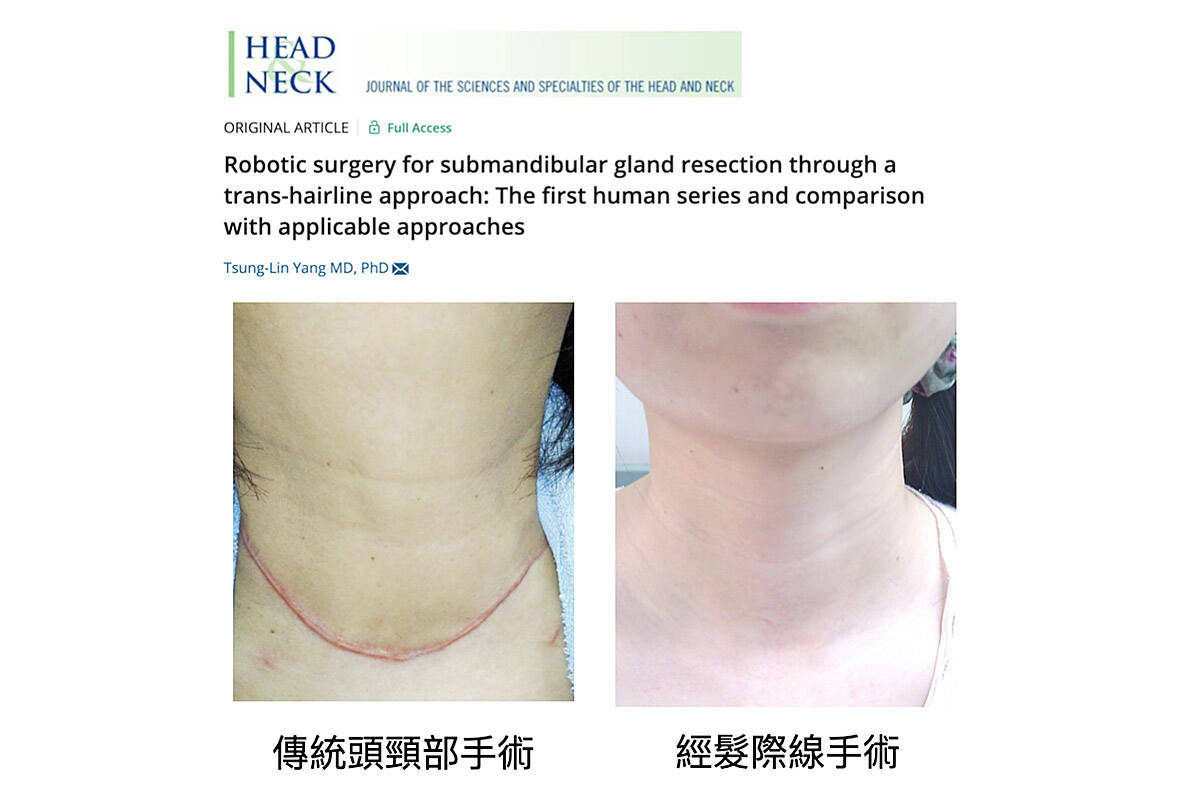National Taiwan University Hospital (NTUH) yesterday unveiled its International Robotic Surgery Training Center, as it celebrated more than 5,000 robotic surgeries in the past 10 years, touting the smaller incisions, less pain and shorter recovery periods for such operations.
The hospital in 2011 installed a robotic-assisted minimally invasive surgery system, NTUH superintendent Wu Ming-shiang (吳明賢) told a news conference in Taipei yesterday.
The number of robotic surgeries at the hospital has risen over the years and its specialist teams have developed innovative robotic surgery procedures, some of which were global firsts, Wu said.

Photo courtesy of National Taiwan University Hospital
The hospital at the news conference touted its partnership with Intuitive, which makes the robotic-assisted Da Vinci Surgical Systems.
Wu and Jason Yang (楊繼盛), vice president and general manager of Intuitive, signed a memorandum of understanding on the advancement of robotic surgeries.
Some of its innovations include the first robot-assisted living donor liver resection and procurement in Asia, a surgery performed by NTU Cancer Center deputy superintendent Wu Yao-ming (吳耀銘); robotic minimally invasive heart surgeries performed by cardiac surgeon Chi Nai-hsin (紀乃新), who standardized the procedure at the hospital and instructed healthcare professionals; and otolaryngologist Yang Tsung-lin (楊宗霖), who invented a nearly scarless robotic surgery for removing tumors in the head and neck, Wu Yao-ming said.
There were 285 robotic surgeries performed in the first year after the system was installed and the number has grown to more than 500 per year in the past few years, with more than 600 expected this year, he said.
Among the 5,104 robotic surgeries performed at the hospital, 39 percent were in the urology department, while colorectal, hepatobiliary, gynecology, head and neck, and cardiac surgeries each accounted for 9 to 14 percent, he said.
The International Robotic Surgery Training Center offers training with instruction from a comprehensive variety of specialties, which would allow surgeons in Taiwan to learn the techniques without having to travel abroad, he said.
A woman in her 60s, surnamed Wu (吳), said she developed a salivary gland tumor a few years ago, but had been hesitant to have open surgery because of the scarring it causes.
However, robotic surgery — which involved a small incision at her hairline — removed the benign tumor and left a scar that was barely visible, she said.
A woman in her 30s surnamed Shi (史) donated part of her liver via robotic surgery nine years ago, Wu Yao-ming said.
Open surgery would have left a scar longer than 50cm, while the patients would usually face a lot of time in hospital after the operation, he said.
In open-heart surgery, the breastbone needs to be cut, so there is a lot of pain, but the surgeries using robots allow better preservation of lung function, reduce hospitalization and recovery time, and allow a quicker return to normal life, Chi said.

Chinese spouse and influencer Guan Guan’s (關關) residency permit has been revoked for repeatedly posting pro-China videos that threaten national security, the National Immigration Agency confirmed today. Guan Guan has said many controversial statements in her videos posted to Douyin (抖音), including “the red flag will soon be painted all over Taiwan” and “Taiwan is an inseparable part of China,” and expressing hope for expedited reunification. The agency last year received multiple reports alleging that Guan Guan had advocated for armed reunification. After verifying the reports, the agency last month issued a notice requiring her to appear and explain her actions. Guan

GIVE AND TAKE: Blood demand continues to rise each year, while fewer young donors are available due to the nation’s falling birthrate, a doctor said Blood donors can redeem points earned from donations to obtain limited edition Formosan black bear travel mugs, the Kaohsiung Blood Center said yesterday, as it announced a goal of stocking 20,000 units of blood prior to the Lunar New Year. The last month of the lunar year is National Blood Donation Month, when local centers seek to stockpile blood for use during the Lunar New Year holiday. The blood demand in southern Taiwan — including Tainan and Kaohsiung, as well as Chiayi, Pingtung, Penghu and Taitung counties — is about 2,000 units per day, the center said. The donation campaign aims to boost

The Kaohsiung Tourism Bureau audited six hotels in an effort to prevent price gouging ahead of Korean band BTS’ concert tour in the city scheduled for Nov. 19, 21 and 22 this year. The bureau on Friday said that the audits — conducted in response to allegations of unfair pricing posted on social media — found no wrongdoing. These establishments included the local branches of Chateau de Chine, Hotel Nikko, My Humble House, and Grand Hai Lai, it said, adding that the Consumer Protection Commission would have penalized price gougers had the accusations been substantiated. The bureau said the Tourism Development Act

The military yesterday said it has located the flight data recorder, or black box, of an F-16V jet that disappeared off eastern Taiwan earlier this month, and it would soon deploy a salvage team to try to retrieve it. Air Force Command Headquarters said that while it had pinned down the location of the black box, it was still searching for the aircraft’s sole pilot, air force Captain Hsin Po-yi (辛柏毅). Without providing details, the air force said it had located the black box days after detecting some intermittent signals and would now engage a team of professionals to retrieve it. The air